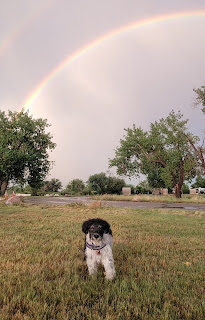"Bad writing is more than a matter of shit syntax and faulty observation; bad writing usually arises from a stubborn refusal to tell stories about what people actually do."
Stephen King
"Video shows officer killing man for a double parked car." 9News web site, 11/8/2023.
That sounds horrible, doesn't it? Traffic cops can be hard-asses, but shooting a guy because he was double parked? No reasonable officer will ever... So I clicked on the link.
It's a tragic story. According to 9News, LaSalle (CO) Police were called to a Family Dollar in the early part of the summer to investigate a suspicious incident. A car was improperly parked. The story is so poorly written that deciding if it was illegally parked is impossible. Upon arrival, the officers discover:
*The car has out of state license plates that do not "come back" - there is no record of them on file, and
*It is a Dodge Magnum that has been repainted using a method other than a professional one.
The officers - a field trainer and his third-day-on-the-job recruit - set about finding the driver of the vehicle. They encounter him in the store, but the suspect bolts, first trying the emergency exit and then fleeing out the front. This is where things get quickly out of control.
The officers have boxed the guy's car in, or so they imagine. He somehow manages to escape. That often means using the getaway vehicle as a battering ram, but the 9News story is silent on that subject. Officers are sometimes inclined to step in front of a desperate person, which sounds silly but even experienced officers with a high degree of education (me, eg.) have done that. 9News is unhelpful there, too. The recruit officer fires at the driver, who is fatally wounded.
And, that's tragic. Bad for the suspect, bad for the officer.
9News offers no explanation why the guy reacted the way he did. Was the car stolen? Was the guy wanted? Not even the admission on the part of the "journalist" that information that might illuminate why this awful situation evolved as it did was not available.
The officer was indicted by a grand jury and charged with second degree murder. It will be up to a court, and perhaps another jury, to decide if he is guilty of that charge beyond a reasonable doubt. The death is unfortunate, a horrible outcome for the person and his family.
It is impossible for a private citizen, even one who spent decades serving in law enforcement, to begin to understand how this might have happened. Consequently, it is also impossible for a private citizen to judge whether their elected officials have handled this case prudently.
It's almost like 9News wants a person skimming the headlines of the day to utter - "You're shitting me" - and click on the story because it cannot possibly be as the headline proclaims.
UPDATE: One can only imagine the phone call. By whatever mechanism, by late afternoon 9News had amended their headline to more accurately describe what happened as "beginning" with a double parking investigation. More accurate is not clearly truthful, but at least it was better.
In the meantime, for those 9News customers who read the headline and nothing more this morning, they are still left with the mistaken impression that a LaSalle police officer shot someone in a dispute over double parking. I wonder, in the greater scheme of things, how many readers of so-called legacy media outlets like 9News wander around believing things that are not true not because they are intentionally misled, but because the quality of writing has fallen so far, so fast.





















